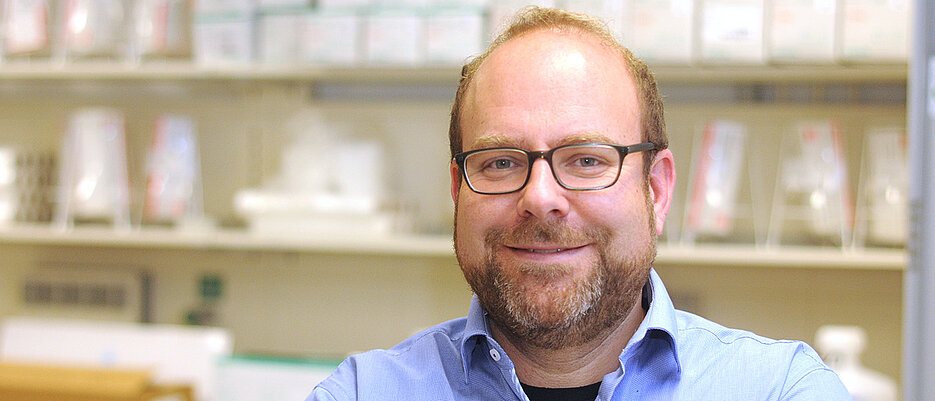Georg Gasteiger studies the immune system
12/11/2017Since June 2017, Georg Gasteiger has been holding the Chair of Systems Immunology II at the University of Würzburg. The newly established professorship is part of the Max Planck Research Group for Systems Immunology that is being set up at the university.

"The type of cells Georg Gasteiger is interested in does not exist." This was the prevailing notion among scientists for many years. Only when researchers went looking for these cells in the right places in the human body, did they find new cell types of the innate immune system, the so-called innate lymphoid cells (ILC).
"Previously, researchers believed that immune cells circulate in the blood and lymphoid organs, for example the lymph nodes, bone marrow and spleen, and migrate to the place of infection only after pathogens have entered the body," Georg Gasteiger explains. Today we know that some immune cells populate all the body's tissues and organs already during their development and stay there throughout their life span.
Front line of defence
"These cells are lymphocytes and they are organized as complex, local assemblies," Gasteiger explains. In the skin, lung and intestine, they make up "the front line of defence to initiate a rapid response to foreign bodies, pathogens or tumours." Additionally, they assume special functions, for example in terms of regeneration and metabolism: "The immune system has important functions also in healthy organs which can be upset by inflammatory diseases, for example," Gasteiger says.
The size of these local assemblies of immune cells, their composition and exact localisation in the tissue differ considerably from organ to organ. So far, scientists know little about how these assemblies evolve, how they are maintained and how they coordinate their tasks among each other. Gasteiger aims to answer such questions to learn more about tissue-specific immunity.
Immunology
What functions do these cells carry out in healthy or diseased organs and how do they respond when the body is threatened by infection? These are other questions that intrigue Georg Gasteiger which he tackles with his team at the department and in the Max Planck Research Group.
Besides his research activities, Gasteiger also teaches at the University of Würzburg. He supports the life sciences programmes at the "Immunology" department where he teaches students of special courses at the Graduate School for Life Sciences the latest in his discipline.
Georg Gasteiger's curriculum
Georg Gasteiger was born in Freising in 1976. He studied medicine in Munich, Vienna, Buenos Aires and New York. After doing his PhD, he completed specialist training in microbiology, virology and epidemiology of infectious diseases at the Technical University of Munich in 2009.
In 2010, he went to the US as a postdoc where he researched at the Memorial Sloan Kettering Cancer Center and at the Howard Hughes Medical Institute for four years. His work was supported by an Irvington Fellowship from the Cancer Research Institute (New York).
In 2015, Gasteiger returned to Germany where he established an Emmy Noether Junior Research Group at the University of Mainz. Funded with some EUR 1.5 million by the German Research Foundation (DFG), his team has since been studying the question of how the innate and the acquired immune system interact.
Gasteiger took the Emmy Noether Group with him when he joined the University of Freiburg as a professor for microbiology and molecular immunology in 2016. In June 2017, he accepted an appointment at the University of Würzburg – again taking the Emmy Noether Group with him.
From 2018, Gasteiger's research activities will also be funded by a five-year ERC Starting Grant, one of the most prestigious European science award.
Award from Boehringer Ingelheim Fonds
During his time in Mainz, Georg Gasteiger received the portion of the Boehringer Ingelheim Award dedicated to fundamental research in 2016. The award was given to Gasteiger because he had confirmed that ILCs are local defence cells adapted to their respective tissues. He had published this finding in the journal "Science" together with colleagues from New York.
DFG Priority Programmes
Just how important ILCs are is reflected in one of the support programmes of the DFG which launched the Priority Programme "Innate Lymphoid Cells" some time ago (http://spp-innatelymphoidcells.de). With these subject-specific support programmes, the DFG promotes projects in comparably young and promising research disciplines.
Georg Gasteiger's team is also represented in the programme – as one of about 20 laboratories in Germany. The scientists have an amount of about EUR 350,000 at their disposal for the next three years.
Contact
Prof. Dr. Georg Gasteiger, Institute of Systems Immunology, University of Würzburg,
T +49 (0)931 31-84717, georg.gasteiger@uni-wuerzburg.de






